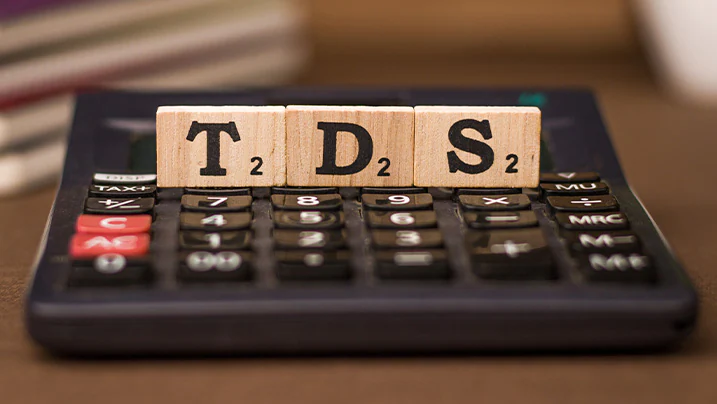
TDS – What Is Tax Deducted at Source – TDS Meaning, Filing, Return & Due Dates
Many of the businesses register as a Private Limited entities and then they start doing business without knowing the basics of book-keeping, accounting & compliances regarding the Private Limited Companies. Actually, they are the beginners and new to the field of finance, taxes & accounting. In this article I specially focused for the people who are new and layman to these areas.
TDS is basically a part of income tax. It has to be deducted by a person for certain payments made by them. In this article, we will discuss in detail the TDS provisions under the Income Tax Act.
What is TDS ? – TDS Meaning & Full Form
TDS or Tax Deducted at Source is income tax reduced from the money paid at the time of making specified payments such as rent, commission, professional fees, salary, interest etc. by the persons making such payments. Usually, the person receiving income is liable to pay income tax. But the government with the help of Tax Deducted at Source provisions makes sure that income tax is deducted in advance from the payments being made by you. The recipient of income receives the net amount (after reducing TDS). The recipient will add the gross amount to his income and the amount of TDS is adjusted against his final tax liability. The recipient takes credit for the amount already deducted and paid on his behalf.
Let’s understand the concept by an example-
Zomato Private Limited make a payment for office rent of Rs 50,000 per month to the owner of the property. TDS is required to be deducted at 10%. Zomato Pvt ltd must deduct TDS of Rs 5000 and pay the balance of Rs 45,000 to the owner of the property. Thus, the recipient of income i.e. the owner of the property in the above case receives the net amount of Rs 45,000 after deduction of tax at the source. He will add the gross amount i.e. Rs 50,000 to his income and can take credit of the amount already deducted i.e. Rs 5,000 by Zomato Pvt Ltd against his final tax liability.
Now the Question arises in your mind that how will I get to know that TDS is applicable on this and this transaction by this rate ????
So here are few inclusive list of transactions where before making any payment, you need to be aware about TDS applicability.
- Salary
- Payments to Contractors
- Commission Payments
- Sale of House
- Rent of Building
- Rent of Plant & Machinery & Furniture
- Interest on Loans
- Interest on Securities
- Professional Fees
- Technical Fees to freelancers
- Online Gaming
- Winning from games like Lottery/crossword/Puzzles/Card etc
- Insurance Commission
- Interest on Perquisites
What is the due date for depositing the TDS to the government?
The Tax Deducted at Source must be deposited to the government by the 7th of the subsequent month.
However, For instance TDS deducted in the month of June must be paid to the government by the 7th of July. However, the TDS deducted in the month of March can be deposited till 30th April. For TDS deducted on rent and purchase of property, the TDS payment due date is 30 days from the end of the month in which TDS is deducted.
How and when to file TDS returns?
| Form No | Transactions reported in the return | Due date |
| Form 24Q | TDS on Salary | Q1 – 31st July Q2 – 31st October Q3 – 31st January Q4 – 31st May |
| Form 27Q | TDS on all payments made to non-residents except salaries | Q1 – 31st July Q2 – 31st October Q3 – 31st January Q4 – 31st May |
| Form 26QB | TDS on sale of property | 30 days from the end of the month in which TDS is deducted |
| Form 26QC | TDS on rent | 30 days from the end of the month in which TDS is deducted |
How the person whose TDS deducted will claim it ?
Since, Once TDS is deducted by One person (referred as Deductor) it will be shown in the 26 AS of the person whose payment is deducted (referred as Deductee) & he can claim it as a refund if his income does not exceeds the taxable amount of Income just by filing his Income Tax Return (ITR).
When should TDS be deducted and by whom?
Any person making specified payments mentioned under the Income Tax Act is required to deduct TDS at the time of making such specified payment. But no TDS has to be deducted if the person making the payment is an individual or HUF whose books are not required to be audited.
In case of Salaried person, Your employer deducts TDS at the income tax slab rates applicable. Banks deduct TDS @10%. Or they may deduct @ 20% if they do not have your PAN information.
For most payments rates of TDS are set in the income tax act and TDS is deducted by the payer basis of these specified rates. If you submit investment proofs (for claiming deductions) to your employer and your total taxable income is below the taxable limit – you do not have to pay any tax. And therefore no TDS should be deducted from your income.
Similarly, you can submit Form 15G and Form 15H to the bank if your total income is below the taxable limit so that they don’t deduct TDS on your interest income. In case you have not been able to submit proofs to your employer or if your employer or bank has already deducted TDS and your total income is below the taxable limit) – you can file a return and claim a refund of this TDS. The complete list of Specified Payments eligible for TDS deduction along with the rate of TDS.








